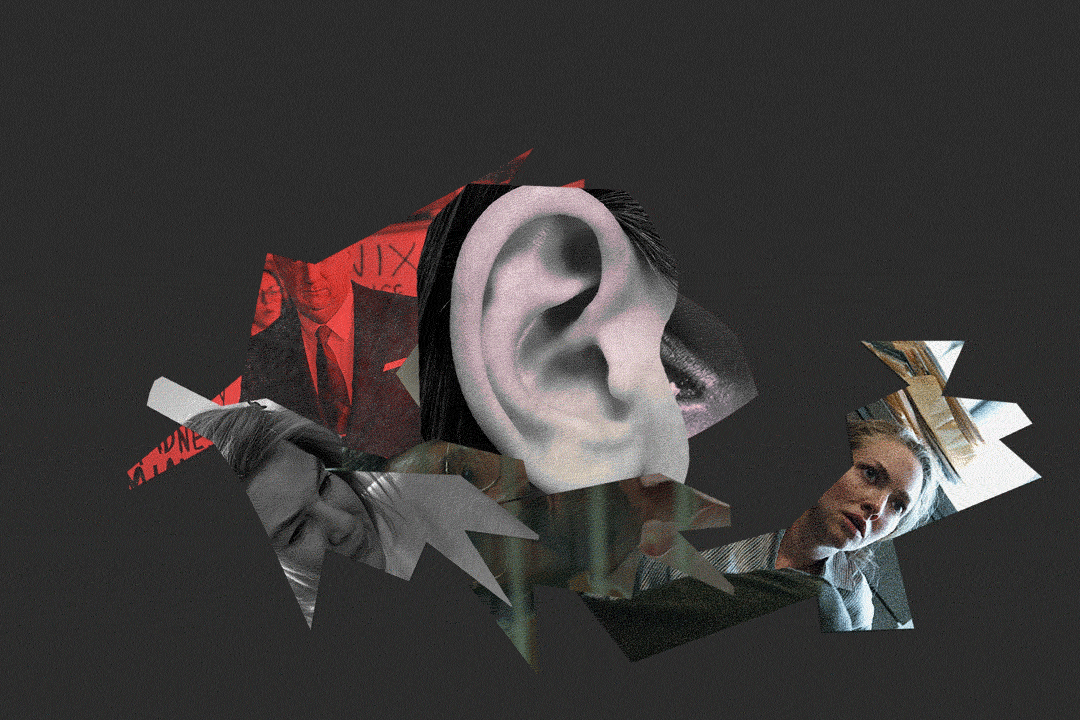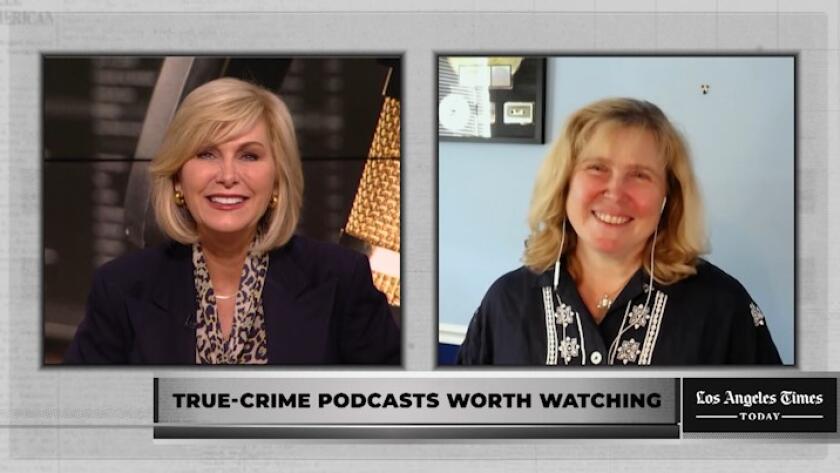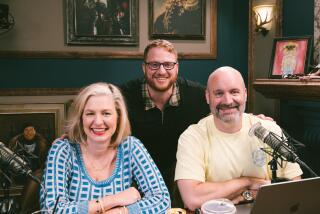True-crime podcasts coming to a limited series near you

Hereâs how to know youâre living in peak TV: when the very specific subgenre of true-crime-podcast-inspired anthology/limited series has enough shows in it to make up a whole possible Emmy category. This season alone, potential contenders include âGaslit,â âThe Thing About Pam,â âDr. Death,â âThe Shrink Next Doorâ and âThe Dropout,â just for starters.
And hereâs one other way to gauge it: The genre is so popular itâs even been meta-fictionalized in yet another series, âOnly Murders in the Building,â in which three amateur detectives become amateur podcasters for the sole purpose of discussing their crime-solving with the public.
So yes: Itâs peak true-crime-podcast season, and welcome to it.
âWe gravitated to podcasting because it felt like this classic and modern confluence,â notes âMurdersâ executive producer Jess Rosenthal. âItâs a new way to do voice-over, and I love that podcasting is considered so modern and in the zeitgeist â but is also a wonderful return to early radio.â
The ongoing popularity of podcasts has provided fertile ground for TV adaptations, as producers, networks and other developers latch on to the deep, first-person journalistic reporting in podcasts to launch more glossy, A-list-starring reinventions. Some touch on national scandals (âDropoutâ focuses on Elizabeth Holmes/Theranos; âGaslitâ on Martha Mitchell/Watergate); others look at crimes usually handled by newsmagazines (âThe Shrink Next Doorâ is about a businessman and the psychiatrist who exploited him for decades, while âThe Thing About Pamâ is based on a âDatelineâ podcast and tells the story of an eccentric womanâs involvement in another womanâs murder); others come with a social agenda (âDr. Deathâ is about a neurosurgeon who brutalized his patients, but it also puts the medical system that allowed him to continue practicing under the microscope).
Series creator Liz Meriwether and director Erica Watson on Linda Tanner, Billy Evans, Sunny Balwani and how they decided to end Elizabeth Holmesâ saga.
The question, though, is why? Of all the true crime out there, what is it about the fact that all these stories inspired podcasts that makes them worthy of retelling in another medium?
The answer is complicated. The simplest reason seems to be that podcasts â as Rosenthal notes â are part of the zeitgeist. Thereâs a brand recognition that makes them seem trendy and fresh, even if they are basically long-form radio journalism. But it also appears that showrunners who turn podcasts into TV series hope to fashion an additional narrative dimension to the stories being told. And that means they can weave some fiction into the facts of any given case.
âI never wanted to do a Wikipedia rundown of what happens,â says Robbie Pickering, creator and showrunner of âGaslit.â âI feel less adherent to the actual events than to the emotional truth of what happened â and the emotional truth of the characters. I was interested in doing a show about the wages of complicity. That felt like a real emotional question to me.â
Thereâs an interesting switch that flips when a podcast becomes a TV adaptation. Real people become âcharactersâ and in doing so become hybrids of the real and the symbolic. âPamâsâ creators were so entranced by the weird machinations of the real-life Pam Hupp that showrunner Jenny Klein says they told whole sequences through a âPam visionâ POV.
âThatâs where weâre representing the way Pam tells stories, which are jagged and abrupt and contradictory and sometimes physically impossible,â Klein says. âSo that absurdity became part of the woven tone of our show.â
In such a shift, the show creator or showrunnerâs underlying thesis is exposed: This is how they want to connect the individual crime to larger societal ills or psychosis. âShrinkâ showrunner Georgia Pritchett says the gaslighting the doctor does to the businessman is something everyone can relate to and understand, post-Trump presidential years.
âI felt in the right circumstances it could happen to any of us,â she says. âIâve written about the country being in an abusive relationship with the president, who gaslit [citizens] and insisted he didnât say what he said. Even though this story started in the 1980s, it felt like something weâre in danger of and experiencing in the current climate.â
Podcasts are at least as old as the new millennium and have been increasing in popularity for years. But the lockdown and quarantines of the pandemic seem to have turbocharged interest in them, as audiences searched for fresh material to listen to (and show creators looked for new stories to tell).
âWe were all closed up in our homes and escaping through podcasts, and these true crime stories speak to our collective fascination for the macabre,â says Klein. âTaking in these true, scary stories in the safety of your own home â there can be a comfort in that, like when youâre in bed and you hear a thunderstorm.â
âEveryone was so desperate for content for entertainment [during the pandemic] that podcasts could take their minds off what we were dealing with,â says âDr. Deathâ creator-executive producer Patrick Macmanus. âYou couldnât take your TV with you when you got out of the house â so youâd take walks and listen to things. You could become the filmmaker in your own mind of what youâre reading and listening to.â
Additionally, podcasts are TV-friendly in a structural way; episode counts are often similar to streaming season episode numbers, and stories naturally revolve around a limited group of individuals who might inspire a producer to think about casting decisions.
âItâs a great styling tool for television,â says âDropoutâ creator Elizabeth Meriwether. âMany podcasts have that bingeing structure, where at the end of one episode you feel like you have to listen to the next one.â
âThey give producers brand reassurance,â agrees Pritchett. âPeople have already responded to this story, so theyâre willing to make things more interesting and diverse. So many podcasts are well made and so evocative that people feel theyâre unwrapping something. Thereâs something immediate about hearing that voice in your ear telling you a story.â
Whatever the reason, Hollywood seems likely to remain in love with true crime podcasts for a while yet. Thereâs an unending stream of surprising tales that can provide windows into that emotional truth creators seek.
âWhen you watch a fictional fantasy show, the entirety of the story is in that show,â says Klein. âThereâs nothing else. But with a true crime story, thereâs always more. Thereâs a whole rabbit hole of details. The story â itâs alive.â
Watch L.A. Times Today at 7 p.m. on Spectrum News 1 on Channel 1 or live stream on the Spectrum News App. Palos Verdes Peninsula and Orange County viewers can watch on Cox Systems on channel 99.
More to Read
From the Oscars to the Emmys.
Get the Envelope newsletter for exclusive awards season coverage, behind-the-scenes stories from the Envelope podcast and columnist Glenn Whippâs must-read analysis.
You may occasionally receive promotional content from the Los Angeles Times.












